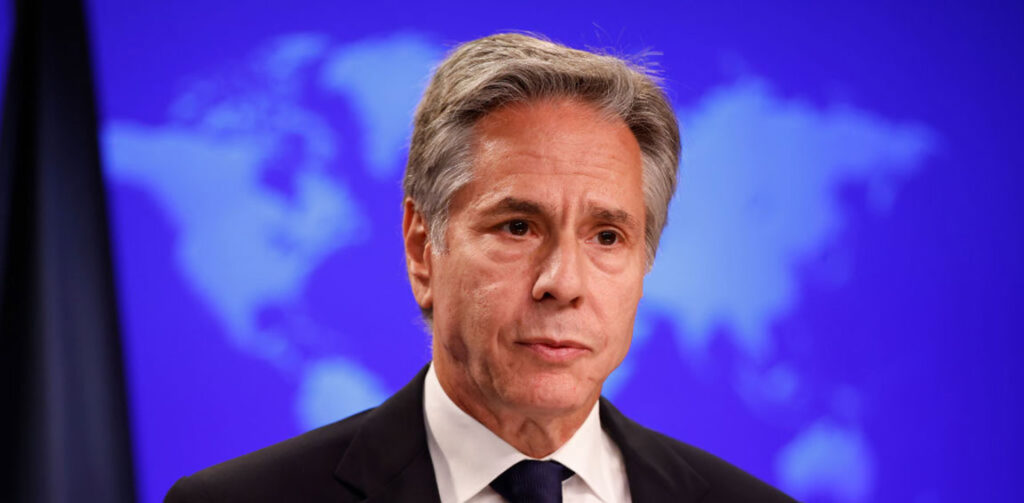U.S. Secretary of State Antony J. Blinken delivers remarks about Russian propaganda activities at the state television network, RT, in September 2024. AFP/GETTY IMAGES
THE WATCH STAFF
The Russian state television network, RT, is acting as an arm of that country’s intelligence services, U.S. Secretary of State Antony J. Blinken said in September 2024 when announcing new sanctions to curb the network’s access to global financing. Blinken’s announcement came just days after the U.S. Department of Justice indicted two RT employees accused of funneling nearly $10 million to a Tennessee video streaming site that pushed Moscow’s propaganda. Blinken said that RT no longer acted simply as a state-owned news organization. Instead, the U.S. government said, RT carries out covert operations in the U.S. and other countries, acting at the behest of Kremlin intelligence operatives.
“Today, we’re exposing how Russia deploys similar tactics around the world,” Blinken said at a State Department news conference. “Russian weaponization of disinformation to subvert and polarize free and open societies extends to every part of the world. We urge every ally, every partner, to start by treating RT’s activities as they do other intelligence activities by Russia within their borders,” he added, according to The New York Times newspaper.
Canada, the United Kingdom and the U.S. simultaneously leveled sanctions against RT, which the allied governments say wages disinformation campaigns, like the one using Tenet Media, the Tennessee company, but also cyberespionage, fundraising for Russia’s war in Ukraine and the laundering of funds to covertly purchase light materiel, including sniper rifles, drones and night vision goggles from China and other countries. The sanctions would affect RT’s ability to access global finance markets, making it more difficult for the network to operate outside Russia’s borders, the Times reported.
U.S. intelligence officials have said Russia is actively attempting to sow chaos in the November U.S. presidential election. They say that Russia is also meddling in upcoming elections in Argentina, France and Moldova. The goal of the sanctions is to expose Russian influence campaigns in African, Asian and Latin American countries where RT remains a source of global news. “We will not stand by as RT and other actors carry out covert activities in support of Russia’s nefarious activities,” Blinken said. “And we’ll continue to respond forcefully to Moscow’s playbook of aggression and subversion, one that includes invading sovereign nations, fomenting coups, weaponizing corruption, carrying out assassinations, meddling in elections and unjustly detaining foreign nationals.”
Last year, the State Department’s Global Engagement Center, which monitors foreign propaganda and disinformation, disclosed a covert information operation to push Kremlin-friendly content in Central and South America by producing articles that appeared to originate with local media organizations, not the Russian government. “We’re exposing what they do in country after country around the world,” James P. Rubin, the Global Engagement Center’s coordinator, told the Times.
Blinken referenced the sanctions later in September at another State Department news conference when he laid out the case for proactively combating propaganda from strategic adversaries. “Accurate information is vital to the health of any democracy. It helps citizens understand the issues and effects – and events that are affecting their lives. It empowers them to engage meaningfully in their communities, their country, the world. When state or non-state actors spread disinformation, material deliberately meant to deceive or divide our public, they attack the very foundations of our free and open society,” he said.

